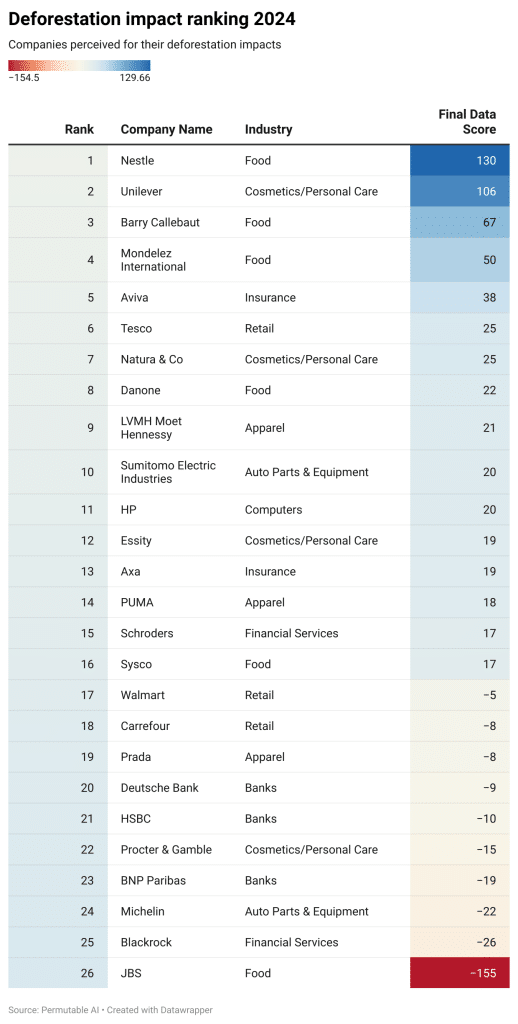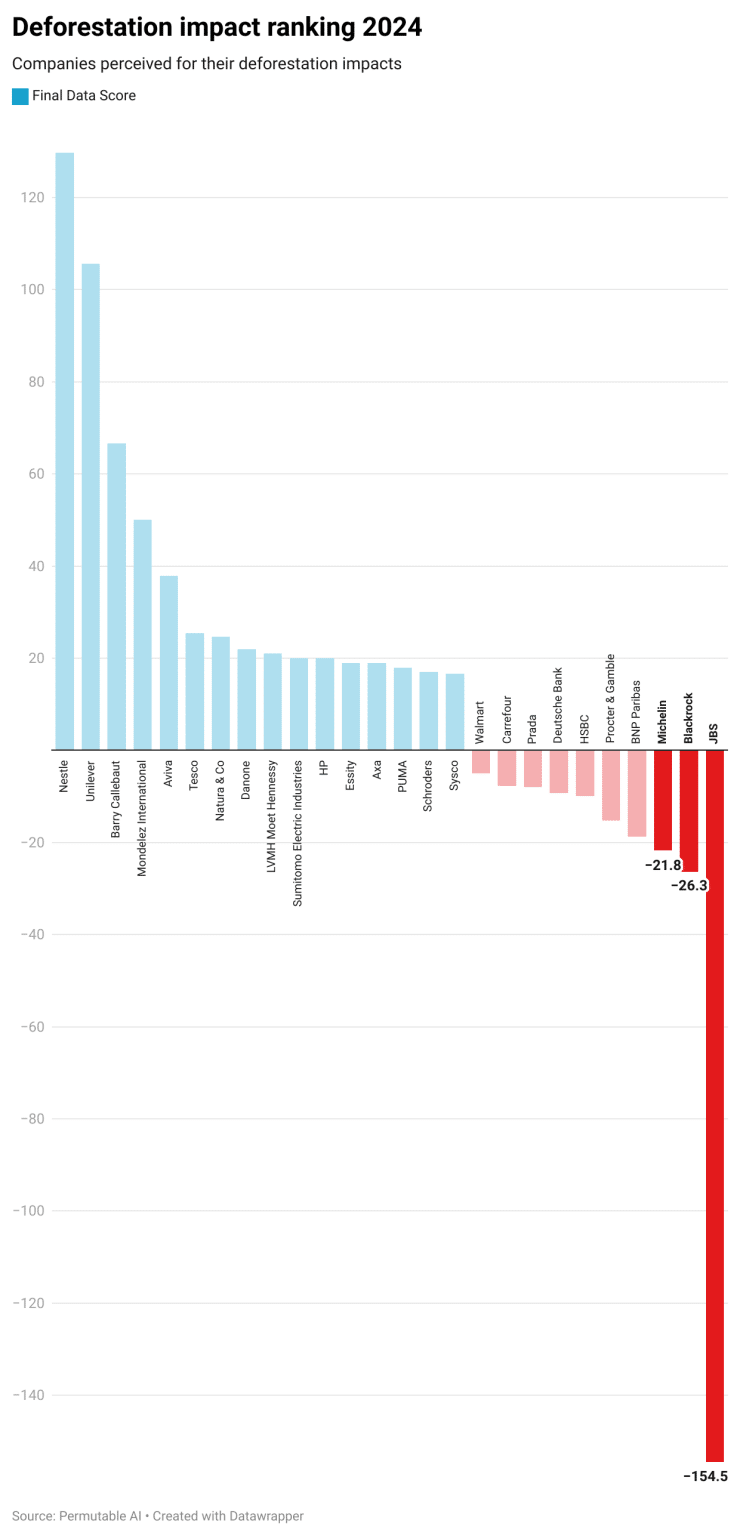In an analysis released today to mark International Day of Forests, Permutable AI unveils its 2024 Best and Worst Companies For Deforestation Impact Ranking, spotlighting corporate deforestation practices.
Using state-of-the-art AI and sentiment analysis, Permutable AI has meticulously analysed over 500,000 articles from an average of 10,000 sources daily. This robust analysis aims to gauge public and market sentiment towards corporate practices related to deforestation.
The ranking – which provides an update to the Deforestation Impact Ranking 2023 release– reveals that Nestle, Unilever, and Barry Callebaut lead with positive sentiment, showcasing the food and cosmetics/personal care industries’ efforts towards sustainable practices and reduced deforestation impact. These companies have been recognised for their commitment to ethical sourcing, sustainable agriculture, and proactive steps towards zero net deforestation, reflecting a growing trend of corporate responsibility and environmental stewardship.
The analysis criticizes JBS, Blackrock, and Michelin for their sustainability efforts, particularly regarding deforestation, urging these companies to bridge the gap between their environmental promises and real-world impacts. It calls for JBS to overhaul its supply chain practices linked to Amazon deforestation, for Blackrock to align its investments with its sustainability claims, and for Michelin to source natural rubber more responsibly.
“Our 2024 Deforestation Impact Ranking highlights the critical role of corporate actions in environmental conservation,” said Wilson Chan, CEO & Founder of Permutable AI. “As we approach International Day of Forests, it’s imperative to recognise the companies leading the way in sustainability and those that have significant room for improvement. Our analysis provides a unique lens through which the public, investors, and companies themselves can evaluate and enhance their environmental impact strategies.”
Permutable AI’s innovative approach to analyzing sentiment and public opinion opens new avenues for understanding the complex dynamics between corporate practices and environmental sustainability, encouraging positive change towards a more sustainable future.
Best and Worst Companies for Deforestation Impact: Findings

- JBS, Blackrock, and Michelin are perceived negatively due to their association with deforestation-driven industries. JBS’s cattle ranching in the Amazon, Blackrock’s investments in deforestation-linked sectors, and Michelin’s reliance on natural rubber all contribute to their environmental scrutiny. Despite sustainability efforts, their substantial impacts on deforestation remain a critical concern.
- BNP Paribas, Procter & Gamble, and HSBC are highlighted for their roles in deforestation, with BNP Paribas financing deforestation-linked sectors, Procter & Gamble using palm oil and pulp from high-deforestation areas, and HSBC funding companies in destructive industries. Despite commitments to sustainability, their significant environmental footprints highlight ongoing challenges in mitigating deforestation impacts.
- Nestle, Unilever, and Barry Callebaut earn positive recognition for their commitment to sustainability, focusing on responsible sourcing to combat deforestation. Nestle and Unilever’s sustainable practices in ingredient sourcing, alongside Unilever’s involvement with the RSPO, set industry standards. Barry Callebaut’s support for sustainable cocoa farming emphasizes environmental responsibility.
- Mondelez International, Aviva, and Tesco are perceived positively due to their commitment to sustainability and efforts to mitigate environmental impacts. Mondelez’s Cocoa Life programme focuses on sustainable cocoa farming to prevent deforestation. Aviva promotes responsible investment for environmental sustainability, while Tesco aims for zero net deforestation in its supply chain.
- Natura & Co, Danone, and LVMH stand out for their sustainability initiatives aimed at reducing their environmental footprint. Natura & Co is positively perceived for its ethical sourcing and biodiversity conservation efforts, particularly in the Amazon. Danone prioritizes regenerative agriculture and sustainable ingredient sourcing to combat deforestation. LVMH focuses on sustainable sourcing of raw materials for its luxury goods.

Methodology used for Best and Worst Companies for Deforestation Impact Ranking 2024
Permutable AI’s analysis is rooted in a sophisticated methodology designed to capture a wide spectrum of sentiment towards companies, in this case specifically regarding deforestation impact. The dataset encompassed on average 500,000 articles scanned daily, ensuring a comprehensive and current representation of market sentiments.
Sentiment analysis was meticulously conducted on textual data from articles related to each company, assessing overall sentiment—positive, negative, and neutral—towards the company in the media. The methodology involved identifying and quantifying specific positive and negative data points within the articles, offering a nuanced view of public perception.
A final sentiment score, ranging from -100 to 100 was then allocated to reflect an aggregate evaluation of each company’s perceived deforestation impact. This scoring system is based on a balanced assessment, factoring in both positive and negative sentiments to provide a holistic view of each company’s market perception.
To ensure robust and reliable analysis of best and worst companies for deforestation, companies with significant market influence were selected based on a minimum market capitalisation threshold of £10 million, with a minimum data cap in force to ensure substantial data coverage, enhancing the accuracy of the sentiment analysis.
Chan emphasizes, “Our methodology for our Best and Worst Companies for Deforestation Impact Ranking is designed not merely to pinpoint areas for improvement but to stimulate a conversation that encourages companies towards adopting greener practices. By shedding light on these concerns, we aspire to foster a marketplace that is more transparent, informed, and committed to ethical environmental practices.”
Find out more
For further insights and a deeper dive into our 2024 Deforestation Impact Ranking, we invite journalists, industry experts, and sustainability advocates to get in touch. Our comprehensive analysis, spanning over half a million articles and thousands of sources, offers an unparalleled view of corporate practices and their impact on our planet’s forests. If you’re looking to explore the data behind our rankings, seek detailed case studies, or wish to discuss the findings with our experts, please don’t hesitate to reach out.
Fill in the form below or reach out to us at enquiries@permutable.ai to request more detailed data, arrange interviews with our analysts, or discuss how these insights can inform your work.
